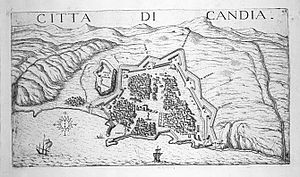Siege of Candia
| Siege of Candia | |||||||||
|---|---|---|---|---|---|---|---|---|---|
| Part of the Cretan War (Fifth Ottoman–Venetian War) | |||||||||
 The city of Candia with its fortifications, 1651 |
|||||||||
|
|||||||||
| Belligerents | |||||||||
|
|
|
||||||||
| Commanders and leaders | |||||||||
|
|
Francesco Morosini | ||||||||
| Strength | |||||||||
|
60,000 soldiers 20,000 workers and miners |
10,000 European allies men 12,000 Greek & Venetians Citizens |
||||||||
60,000 soldiers
10,000 European allies men
The Siege of Candia (modern Heraklion, Crete) was a military conflict in which Ottoman forces besieged the Venetian-ruled city. Lasting from 1648 to 1669, or a total of 21 years, it is second longest siege in history after the siege of Ceuta; however, the Ottomans were ultimately victorious despite Candia's unprecedented resistance.
In the 17th century, Venice's power in the Mediterranean was waning, as Ottoman power grew. The Venetian Republic believed that the Ottomans would use any excuse to pursue further hostilities.
In 1644, the Knights of Malta attacked an Ottoman convoy on its way from Alexandria to Constantinople. They landed at Candia with the loot, which included part of the Sultan's harem, returning from a pilgrimage to Mecca.
In response, 60,000 Ottoman troops led by Yussuf Pasha disembarked on Venetian Crete and occupied La Canea (modern Chania) and Rettimo (modern Rethimno). Both of these cities took two months each to conquer. Between 1645 and 1648, the Ottomans occupied the rest of the island and prepared to take the capital, Candia.
The siege of Candia began in May 1648. The Ottomans spent three months laying siege to the city, cutting off the water supply, and disrupting Venice's sea lanes to the city. For the next 16 years, they would bombard the city to little effect.
The Venetians, in turn, sought to blockade the Ottoman-held Dardanelles to prevent the resupply of the Ottoman expeditionary force on Crete. This effort led to a series of naval actions. On 21 June 1655 and 26 August 1656, the Venetians were victorious, although the Venetian commander, Lorenzo Marcello, was killed in the latter engagement. However, on 17–19 July 1657, the Ottoman navy soundly defeated the Venetians and the Venetian captain, Lazzaro Mocenigo, was killed by a falling mast.
...
Wikipedia
